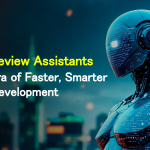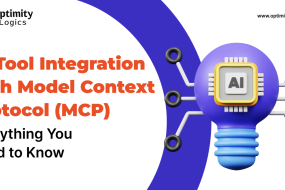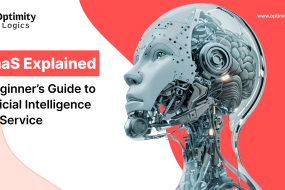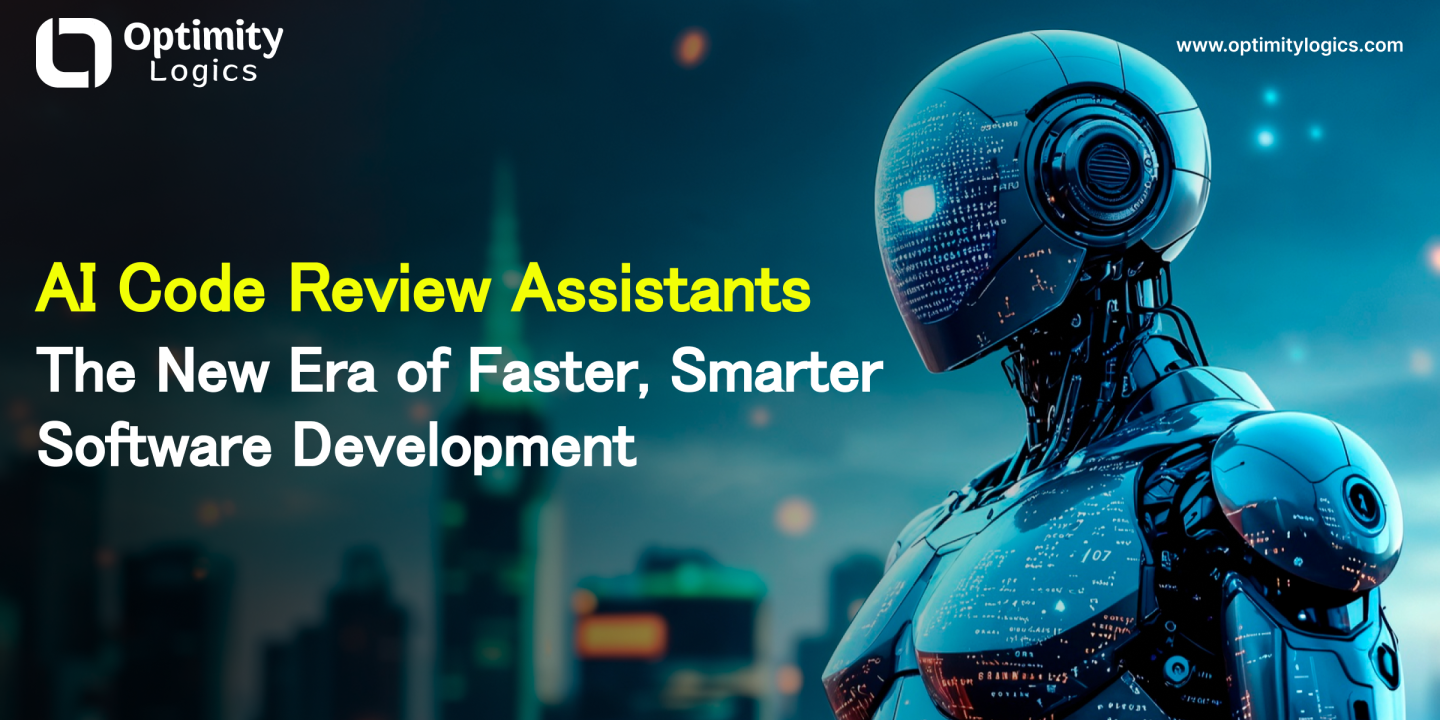
In the evolving world of software engineering, speed and precision are everything. As businesses demand faster development cycles and flawless code delivery, traditional code reviews often struggle to keep pace. Manual reviews — though essential — can be slow, subjective, and inconsistent, especially in large development teams or complex projects.
Enter the era of AI-assisted code reviews. Artificial intelligence is transforming how developers detect bugs, ensure code quality, and maintain coding standards. From identifying performance bottlenecks to suggesting syntax improvements, AI assistants are no longer experimental — they’re becoming a standard part of modern DevOps pipelines.
At Optimity Logics, we leverage AI not just as a productivity booster but as a collaborative partner in our software development lifecycle. In this article, we’ll explore how AI assistants are reshaping code reviews, the pros and cons of this shift, and how our team integrates AI into our development process responsibly and effectively.
The Evolution of Code Reviews
Code reviews have always been the backbone of quality assurance in software development. Traditionally, they involve one or more developers manually inspecting another’s code for errors, security flaws, and adherence to best practices.
While this method ensures a human understanding of logic and intent, it’s also time-intensive and inconsistent. Two developers might have different opinions about “clean” or “optimized” code. Furthermore, human fatigue or bias can cause oversights, especially under tight deadlines.
The increasing complexity of modern software — with its layers of APIs, microservices, and integrations — has made manual reviews even more demanding. Developers needed a smarter, faster way to catch issues early, and that’s where AI code review tools entered the picture.
What Are AI Code Review Assistants?
AI code review assistants are intelligent tools that use machine learning (ML), natural language processing (NLP), and static code analysis to evaluate code. They act as virtual reviewers that continuously scan, understand, and provide actionable insights into your codebase.
Some popular AI-powered tools include:
- GitHub Copilot – Uses OpenAI Codex to offer context-aware code suggestions and detect simple logic flaws.
- DeepCode (now part of Snyk) – Uses ML to identify bugs, vulnerabilities, and code smells.
- Amazon CodeGuru – Reviews code performance and security while providing cost-optimization suggestions.
- Codacy / SonarQube with AI Enhancements – Tracks code style and quality metrics across large teams.
Unlike traditional static analyzers, modern AI systems learn from thousands of repositories, continuously improving their recommendations and detecting patterns that humans might overlook.
How AI Is Transforming Code Reviews
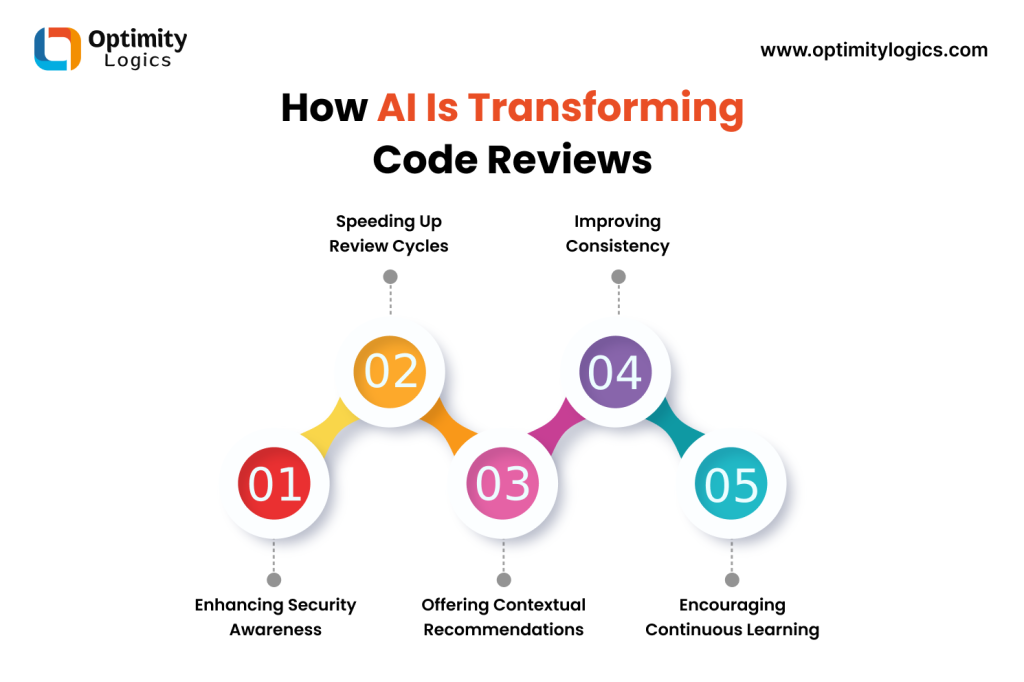
AI assistants aren’t replacing human reviewers — they’re augmenting them. By automating repetitive checks and providing smart feedback, AI helps developers focus on architecture, logic, and creativity. Here’s how AI is changing the game:
1. Speeding Up Review Cycles
AI assistants can analyze large volumes of code in seconds, flagging issues such as unused variables, missing validations, or inefficient loops. This dramatically reduces turnaround time, especially in continuous integration/continuous deployment (CI/CD) pipelines.
2. Improving Consistency
Humans vary in expertise and focus; AI doesn’t. Once trained, an AI model applies the same rules across all projects, ensuring consistent enforcement of coding standards. This is particularly valuable in distributed teams where developers work across time zones and tech stacks.
3. Enhancing Security Awareness
AI-powered review tools can detect security vulnerabilities, such as SQL injections, XSS attacks, or insecure API usage — often before human reviewers even notice them. By learning from open-source security databases and previous commits, AI systems stay updated with the latest threat patterns.
4. Offering Contextual Recommendations
AI tools like Copilot or CodeWhisperer provide context-aware feedback based on the specific function or class being written. Instead of generic suggestions, they tailor advice to your project’s coding style and libraries.
5. Encouraging Continuous Learning
AI reviews also serve as mentors. For junior developers, AI feedback explains why a particular piece of code is inefficient or insecure. Over time, this accelerates learning and reduces the dependency on senior developers for routine questions.
The Pros of AI-Driven Code Reviews
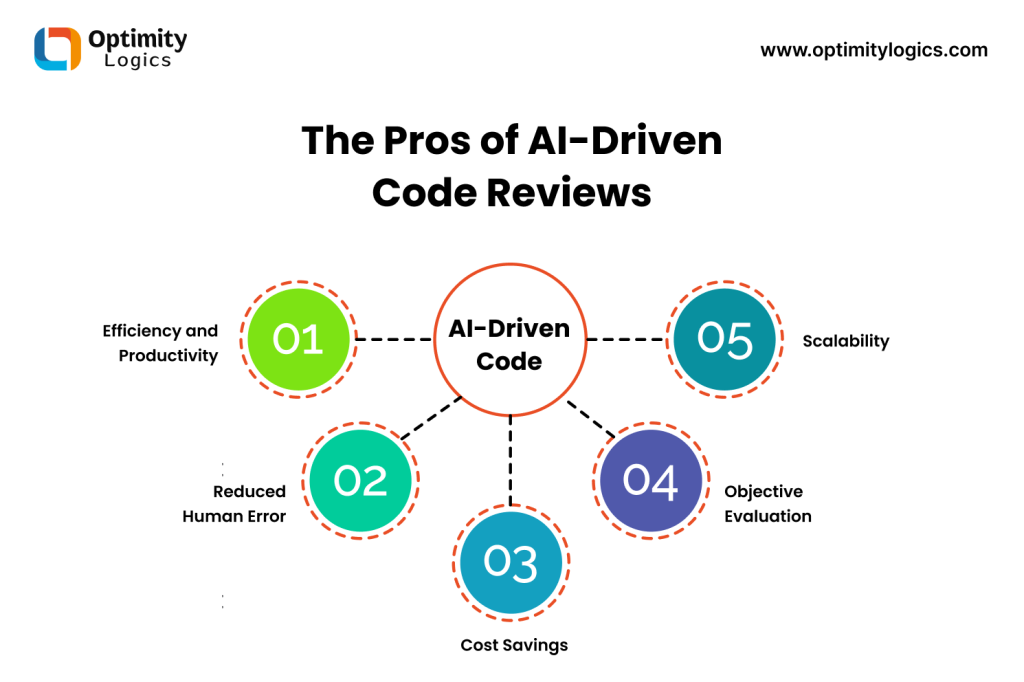
Let’s break down the key benefits businesses experience when adopting AI-assisted code reviews:
1. Efficiency and Productivity
AI automates time-consuming checks, allowing developers to focus on complex problem-solving. Teams can ship features faster without compromising quality.
2. Reduced Human Error
AI doesn’t get tired or distracted. It scans every line, every time, ensuring no minor mistake goes unnoticed.
3. Cost Savings
Early bug detection saves thousands in post-deployment fixes. Companies report up to 30% cost reduction in QA processes when integrating AI review tools.
4. Objective Evaluation
AI eliminates personal bias. It follows standardized rules, making reviews more objective — a huge plus for teams that collaborate remotely or across multiple disciplines.
5. Scalability
Whether your project has 100 lines or 1 million, AI handles it with equal efficiency. It scales seamlessly with growing codebases, ensuring consistent quality control.
The Cons and Challenges of AI in Code Reviews
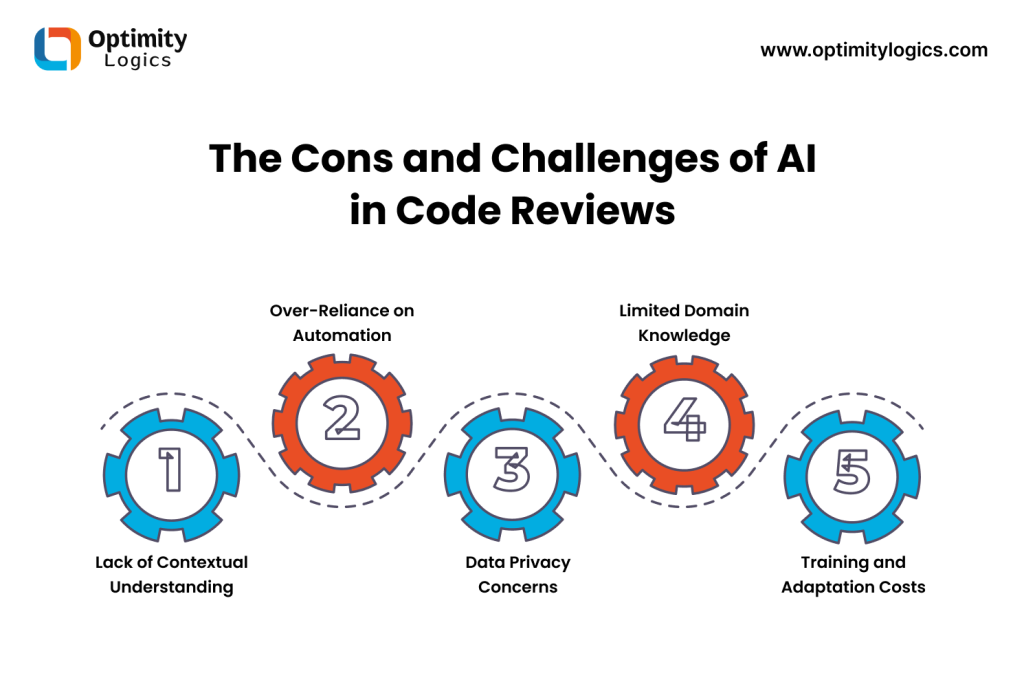
Despite its advantages, AI code review isn’t a magic wand. There are limitations developers and organizations must navigate carefully.
1. Lack of Contextual Understanding
AI may identify issues that technically violate syntax rules but make sense within a specific business logic. Without context, it can generate false positives or irrelevant warnings.
2. Over-Reliance on Automation
Relying too much on AI can make developers complacent. Code reviews should still include human judgment — creativity, intent, and design choices are beyond AI’s grasp (for now).
3. Data Privacy Concerns
Many AI tools rely on cloud-based models that analyze snippets of proprietary code. Without proper configuration, this could lead to data exposure or intellectual property risks.
4. Limited Domain Knowledge
AI learns from open repositories, which might not align with your organization’s frameworks or internal coding practices. Fine-tuning AI models for domain-specific use cases remains a challenge.
5. Training and Adaptation Costs
Integrating AI review tools into your CI/CD pipeline requires configuration, developer onboarding, and sometimes paid licenses. Businesses need a clear strategy to ensure ROI.
What We Do at Optimity Logics
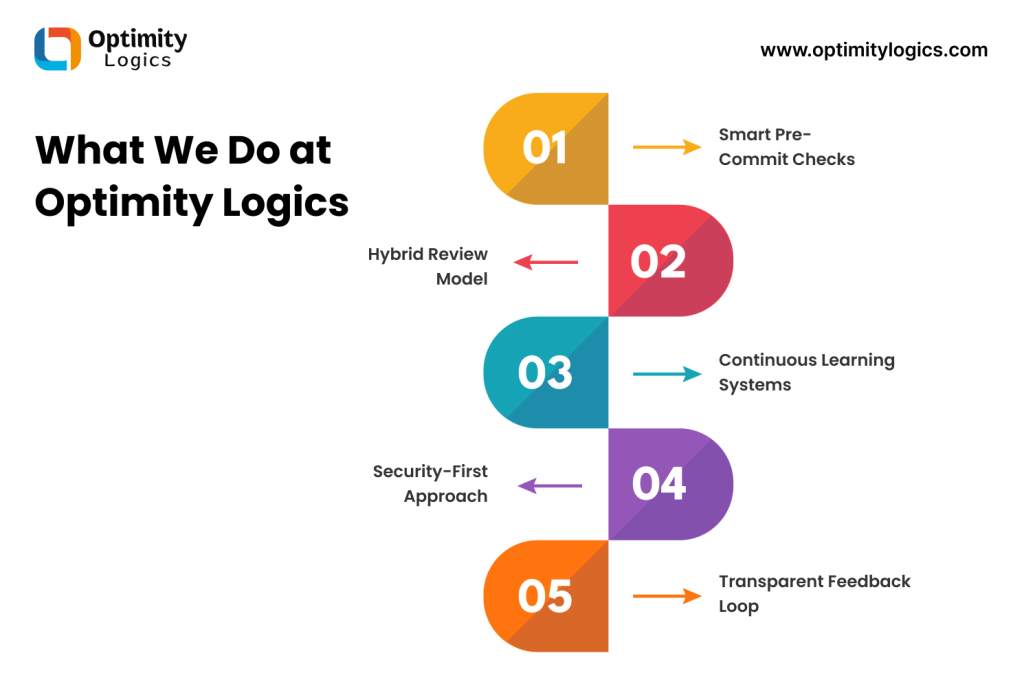
At Optimity Logics, we believe the future of software development lies in human-AI collaboration. Our development process integrates AI assistants at key stages of our software lifecycle — from design to deployment — ensuring speed, security, and scalability without losing the human touch.
Here’s how we approach AI-assisted code reviews in-house:
1. Smart Pre-Commit Checks
Before developers commit their code, our internal AI assistants automatically run pre-checks for syntax, style, and potential vulnerabilities. This ensures only clean, compliant code reaches the main branch.
2. Hybrid Review Model
We combine AI automation with peer reviews. AI handles repetitive scanning and pattern recognition, while our senior engineers evaluate logic, architecture, and usability — ensuring the perfect balance between precision and context.
3. Continuous Learning Systems
Our AI models learn from every review cycle. Over time, they adapt to our project patterns, technology stacks, and custom code conventions, making each future review smarter and more relevant.
4. Security-First Approach
All AI-powered tools we use comply with enterprise-grade data protection standards. Sensitive client code never leaves our secured development environment, ensuring complete confidentiality.
5. Transparent Feedback Loop
Every AI-generated suggestion is reviewed, validated, and documented. This transparency not only improves accountability but also helps new developers understand the reasoning behind every change.
The Human Element Still Matters
While AI can analyze code faster than any human, it can’t replicate the human ability to understand intent or anticipate user behavior. Great software isn’t just about bug-free code — it’s about purpose, performance, and user experience.
That’s why at Optimity Logics, AI doesn’t replace our developers — it empowers them. It helps them write cleaner code, learn faster, and deliver higher-quality software that truly aligns with client goals.
The Future of AI in Code Reviews
The coming years will see AI assistants evolve from reactive tools to proactive partners. Future systems will likely predict bugs before they occur, refactor code autonomously, and even collaborate across teams to suggest architectural improvements.
However, ethical and transparent use of AI will remain crucial. As automation grows, software companies must ensure AI accountability, bias control, and human oversight at every step.
Final Thoughts
AI assistants are redefining what’s possible in software engineering. They’re not just streamlining reviews — they’re creating a new standard of collaboration between humans and machines.
At Optimity Logics, we see this not as a disruption but as an evolution — one that empowers our developers to innovate faster, build smarter, and deliver superior software with confidence.
Want to experience AI-driven software development that blends intelligence with human creativity?
Contact Optimity Logics today to explore how we can transform your next software project with our smart, human-first approach to AI integration.
